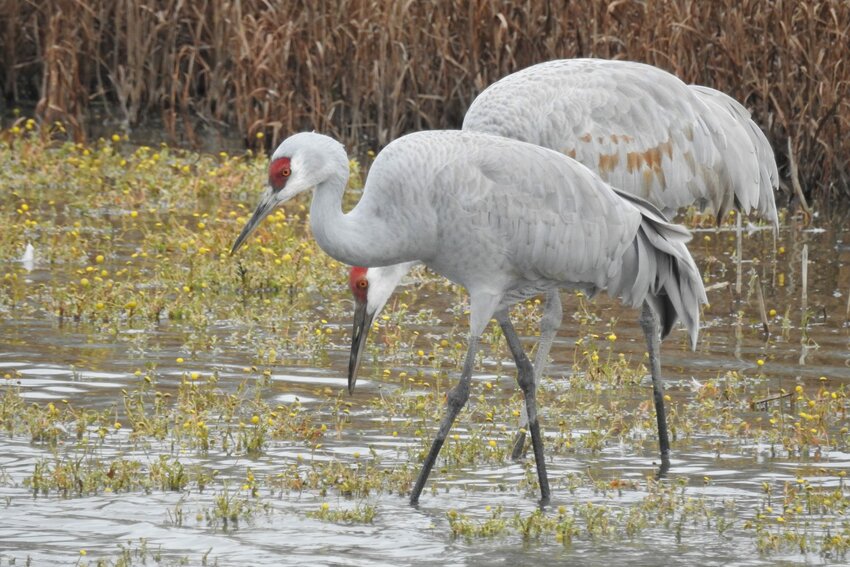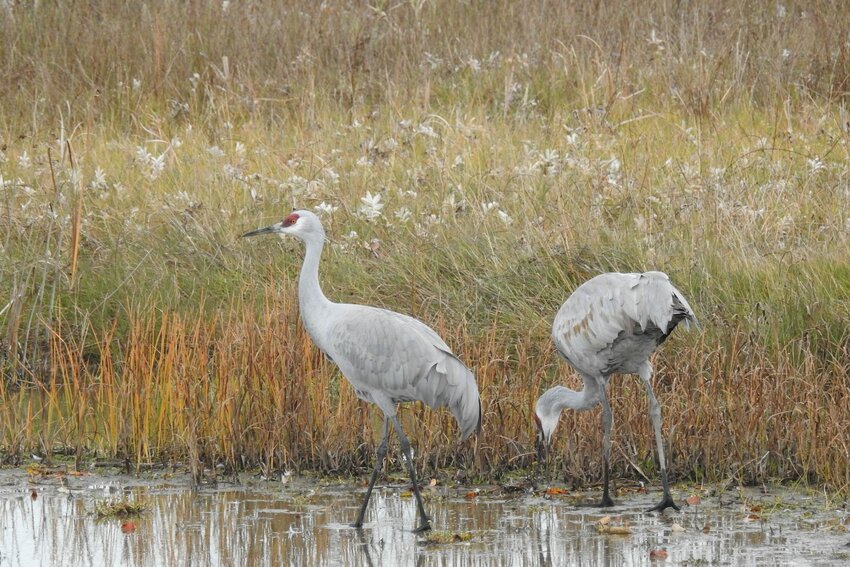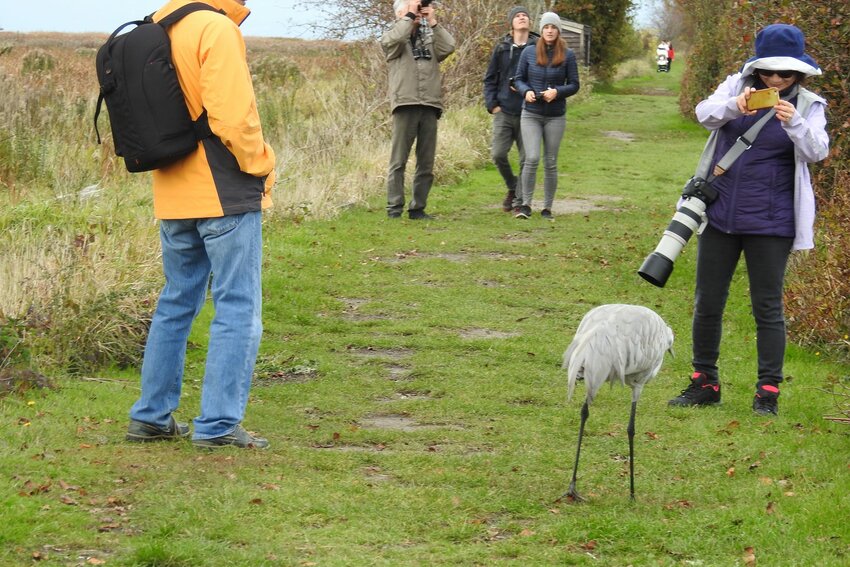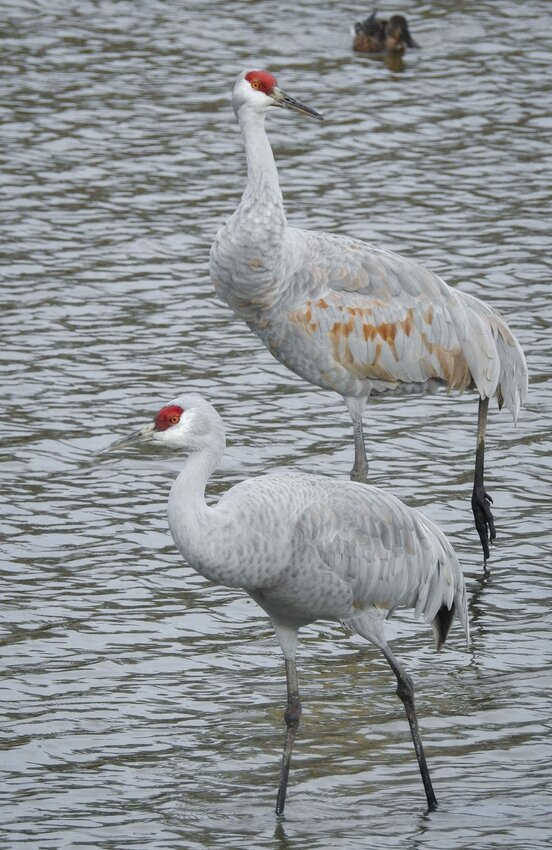 Story and photos by Tara Nelson
Story and photos by Tara NelsonEvery year more than 350 species of migratory birds fly through northern Whatcom County bringing birding enthusiasts and visitors from all over the country and, with them, thousands of dollars in tourism revenue for small Whatcom County cities.
The mudflats and area surrounding Blaine’s Drayton Harbor and Semiahmoo Spit in particular are recognized as one of the most important northerly bird areas of Washington and serve as a pit stop for birds such as loons, brant, dunlin, great blue herons, red-breasted mergansers, bufflehead ducks, mallards, grebes, bald eagles and peregrine falcons.
Now, thanks to a bill being co-sponsored by U.S. Representative Rick Larsen (D-WA) those birds may be better protected after a 2017 Trump administration rule change would have made them more vulnerable to industrial threats.
If adopted, the bill – originally sponsored by U.S. Representative Alan Lowenthal (D-CA) – would reverse the Trump administration rollbacks of the Migratory Bird Treaty Act (MBTA).
 The act, which was passed in 1918, creates a uniform system of protection for more than 1,000 migratory bird species that migrate between the U.S. and Canada – about 350 of which use the Pacific Northwest as their flyway, cutting directly across Whatcom County.
The act, which was passed in 1918, creates a uniform system of protection for more than 1,000 migratory bird species that migrate between the U.S. and Canada – about 350 of which use the Pacific Northwest as their flyway, cutting directly across Whatcom County.
Under Trump’s re-interpretation of the law, however, the federal government cannot pursue penalties on companies that, through negligence or bad practices, kill a significant number of birds. Environmental groups criticized the decision saying that it ignored the intent and language of the law to protect and conserve birds.
Larsen visited Wiser Lake in Lynden in January along with North Cascades Audubon Society president Steven Harper and Robert Kaye, who is a member of the chapter’s conservation board. The visit was part of a round of talks with Whatcom, Skagit and Snohomish county Audubon Society chapters to discuss the rule change.
An important economic driver
Larsen said he is ready to work with the Biden administration to safeguard the MBTA and look for ways to support migratory birds in this year’s spending bill. He also said he sent a letter to Deb Haaland, the incoming Secretary of the Interior, in December, to let her know that he opposed the Trump administration’s rule. Larsen blieves Haaland, who is one of the first Native American women to serve in a presidential cabinet, will be more friendly to measures that will strengthen the MBTA instead of weaken it.
 “Migratory birds are an important environmental symbol and economic driver for communities in the Pacific Northwest,” he said in an email.
“Migratory birds are an important environmental symbol and economic driver for communities in the Pacific Northwest,” he said in an email.
A U.S. Fish & Wildlife Service (USFWS) report shows that birding festivals and events provide substantial economic benefits for communities. For example, in the Rio Grande Valley, birding is estimated to provide $463 million to the economy annually and 6,613 jobs in the region, according to a study by Texas A&M University. Even individual bird sightings can generate economic impacts in the case of rare species, such as a black-backed oriole in Pennsylvania that generated at least $218,000 in local spending by visitors.
While birding for just a day, Larsen said they saw 10 separate bird species including a 2-year-old bald eagle, a pied-billed grebe, cackling goose, American wigeon, common and hooded mergansers and snow geese.
Hunting of migratory birds provides an additional economic benefit of approximately $7.6 billion. Birds also provide economic value through subsistence hunting – a critical source of food for many residents, including for Alaska Natives and tribal communities, without which people may need to pay significant additional costs.
A long-embattled policy change
In August 2020, a federal court struck down the Trump administration’s interpretation, ruling that it is “contrary to the plain meaning of the Migratory Bird Treaty Act” and “runs counter to the purpose of the MBTA to protect migratory bird populations.”
However, on November 23, the USFWS published an environmental impact statement (EIS) on the proposed rule and found that although changes to the MBTA would increase the legal certainty for companies, companies would be less inclined to implement best practices to reduce incidental bird takes, resulting in “increased bird mortality.” Nevertheless, the USFWS upheld the Trump administration’s rule change.
The Biden administration had also delayed the implementation of the Trump administration rollback of MBTA protections, which were finalized just weeks before Biden’s inauguration.
As of press time, Biden had also proposed a new rule taking aim at Trump’s rollbacks, an U.S. Interior Department spokesperson said, adding the department would also reconsider its previous interpretation of the MBTA “to develop common sense standards that can protect migratory birds and provide certainty to industry.”
“Delaying the implementation of the Trump administration’s illegal rollback of the Migratory Bird Treaty Act is the right thing to do,” said Sarah Greenberger, interim chief conservation officer, National Audubon Society. “This delay will allow a full reassessment of the rule change and we are hopeful that these critical bird protections will be reinstated.” x